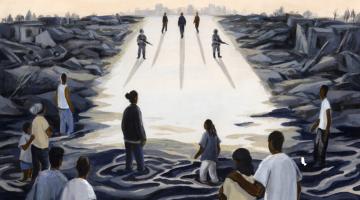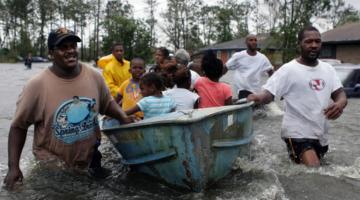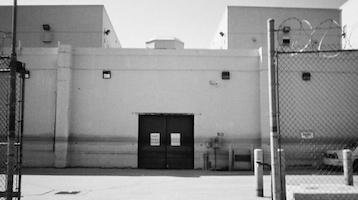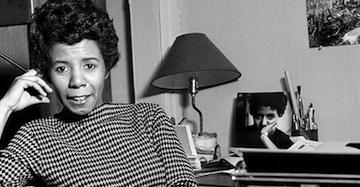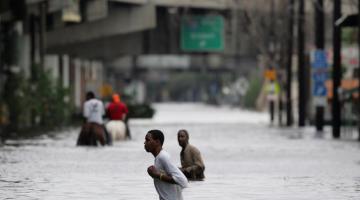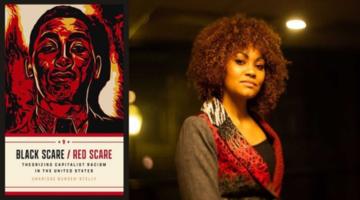The US government left Black residents to die after Hurricane Katrina, refusing Cuba's offer of emergency doctors. This racist neglect exposed a truth that the US state would rather sacrifice its own citizens than undermine its anti-communist crusade.
September 2, 2005. Havana’s Jose Marti International Airport hums with a different kind of mobilization. Doctors, nurses, and medical professionals wait with backpacks full of lifesaving medical supplies. News crackles over the radio: Thousands are displaced in New Orleans after Hurricane Katrina strikes. Within 24 hours, these 1,586 medics have assembled 86 tons of medicine to deploy to New Orleans. The Cuban medical mission waits for US approval, but hours spent waiting become days. Then, a veto: President Bush blocks the mission, citing a “robust” medical response from FEMA.
September 2, 2005. Sirens wail across the city of New Orleans. Black Mothers in the Lower Ninth Ward cling to rooftops praying for aid, as fourteen foot flood swells swallow neighborhood blocks. Children in the New Orleans Superdome vomit from heat stroke, watched by National Guardsmen with M16s. Henry Glover, a 31 year old Black man is executed in a strip mall by the New Orleans Police Department, his body burnt and tossed into the Mississippi River. And on Danzinger Bridge, cops form a firing line and shoot six unarmed Black survivors of the storm. Two victims are killed: Ronald Madison, 40 and James Brisette, 19.
In the days while Cuban doctors waited in an airport, over a thousand people died in New Orleans. The Louisiana Department of Health later confirmed that delayed medical response killed hundreds. FEMA aid trickled in slowly. Hundreds of first responders abandoned their posts. Bush smeared the Cuban mission as ‘propaganda,’ while his government allowed corpses to rot in New Orleans flooded streets. Rather than receive aid from an ‘enemy nation,’ the US allowed New Orleans to collapse.
This wasn’t Cuba’s first international medical mission. Cuba’s revolution and independence movement carried the banner of international solidarity from the very beginning. Jose Marti, the intellectual architect of Cuba’s independence movement, once said: “Patria es Humanidad,” homeland is humanity. (1) Cuba’s independence movement was supported by thousands of international volunteers from across Latin America and Europe, who fought in the country’s war for independence against Spain. (2)
Cuba has made international service a matter of policy. After the victory of the Cuban revolutionaries in 1959, Cuba took immediate action across the globe. In 1963, Cuba entered its first official international engagement in Algeria. Cuba sent doctors to support Algeria’s public health and emergency health systems, beginning an international medical mission that today supplies 900 Cuban doctors to the country.
This began a tide of Cuban medical solidarity rising across Africa, Asia, Latin America, and Europe. Cuba deployed thousands of soldiers and doctors to Angola in the 80s, supporting the African nation in its war for independence against the Portuguese military. (3) Cuba sent hundreds of thousands of volunteer military, professional, and medical experts to support the Angolan people against US and South African-backed forces in a brutal civil war, a decisive chapter in defeating apartheid.
After their victory in Angola in 1988, Cuba continued to build its now-robust international medical taskforces. In the 1990s, after the fall of the Soviet Union, Cuba’s economy collapsed into years of food scarcity and an energy crisis known as the Special Period. In spite of these economic hardships, their international medical programme only grew. In the late 1990s, Cuba intervened in Central America in the aftermath of natural disasters. (4) Cuba built emergency medical facilities, trained local doctors, and provided critical primary care to thousands affected by earthquakes, floods, and hurricanes. (5) By 2005, Cuban doctors had more than forty years of experience deploying into armed conflicts and natural disasters. These doctors were trained and ready to help, as they had in countless other catastrophes. Yet, they were stopped at New Orleans.
What was Cuba’s crime? Offering solidarity and remaining true to its revolution is the offense. Still, the Cubans adapted. They renamed the stalled mission the “Henry Reeve Brigade,” and repurposed the supplies and doctors for a mission to Angola later that month. From fighting cholera in Haiti to aiding Italy during COVID-19 surges, the Brigade has saved thousands of lives. But for Black New Orleanians, Washington chose death.
There were several factors that informed Washington’s decision. Years of countless sanctions, assassination attempts, and sabotage from the US to revolutionary Cuba showed that there was no friendship from Washington to the island nation. Relations only soured in the 2000s. Central to the longstanding tension between Cuba and the US is Guantanamo Bay, a US military facility illegally constructed on Cuban soil. For years, during the Cold War, Guantanamo was an armed fortress, poised to strike against Cuba from the bay of one of its largest cities.
After the end of the Cold War, the US did not return the land - it converted it into prison camps. Guantanamo Bay held thousands of Haitians in prison-like conditions in the 90s, and the Bush Administration converted the camp into a true prison in 2002, sending ‘alleged combatants’ from the US War on Terror to the illegally-held base specifically to deny them habeas corpus. (6) The Cuban government has consistently condemned continued US use of the base as a weapon of imperial war. (7)
This ongoing territorial dispute was one factor of several in the Bush Administration’s calculus. Throughout the 2000s, the US supported several regime change initiatives aimed at destroying socialism in Cuba. Internal initiatives aimed at fostering dissent, such as the Varela Project, received public support from former US presidents (8). The Bush Administration spent hundreds of millions of dollars in the 2000s to foment dissent across Cuba through an onslaught of media, arts, and radio propaganda against the Cuban government, from institutions based in Miami. (9) Thus in 2005, when Cuba responded with an offer of aid after years of hostility, there were cracks in the surface of US politics.
The Bush Administration had challenged Cuba to put its ‘money where its mouth is,’ regarding its humanitarian programs. (10) For Cuba to offer medical aid, at no cost, flew in the face of years of US propaganda. Yet there were those in the government who wanted Cuban aid. Louisiana’s then-governor Kathleen Blanco had signed a $15 million trade deal with the Cuban government months before, expanding economic security through food. (11) The governor welcomed Cuba’s aid after Katrina struck, and even staunchly anti-Castro senators such as Mel Martinez of Florida supported Cuban medical aid. (12) But the highest level of the US government refused to break rank and compromise, sending the medical mission to the dustbin while New Orleans suffered.
In the aftermath of Katrina, Black residents took their health into their own hands. Mutual aid groups, formed with the same zeal that drove revolutionary medical brigades, helped create networks of both emergency and long-term relief for residents. Organizations such as the Common Ground Collective emerged from the grassroots, driven by principles of community care from a radical lens. Founded by local Algiers residents, former Black Panther Party member Malik Rahim, and Texas-based anarchist scott crow, the collective picked up garbage, provided medical relief, and supported New Orleans recovery with over 23,000 volunteers. (13) Cuba’s medical aid could have strengthened community-led projects like these. Instead, Washington chose to police them. Common Grounds’ operations director, Brandon Darby, was revealed in 2008 to be an FBI informant against the mutual aid group. (14) While the US federal government used its resources to surveil community-led disaster relief in New Orleans, Cuba moved to support grassroots medical missions on a global scale.
Cuba’s medical supplies were repurposed for a new mission that same month and thus began the ‘Henry Reeve’ International Medical Brigade - from the ashes of Cuba’s Katrina rescue operation. When the US finally axed the opportunity to collaborate, Cuba immediately pivoted to put its training, resources, and internationalist spirit to use elsewhere. The Henry Reeve Brigade formalized decades of Cuban medical internationalism.
Since 2005, the Henry Reeve Brigade has launched 28 missions in 22 countries. 8,000 Cuban doctors have been part of this Brigade throughout the twenty interceding years. And it has impacted far more lives. In 2017, the World Health Organization awarded the Brigade the prestigious Dr. Lee Jong-wook Memorial Prize for Public Health. (15) In accepting, Cuba’s Minister of Health, Dr. Roberto Morales Ojeda, spoke in appreciation for the 3.5 million people that the Brigade had treated in those twenty years, adding that the Brigade had saved at least 80,000 lives during their missions. (16) Cuban doctors used the failure of Katrina in 2005 to build a bridge to the rest of the world through emergency medical aid.
Twenty years later, Donald Trump’s administration has unleashed a new wave of sanctions against Cuba’s medical missions that once offered aid to US citizens. Still, Cuban doctors look for joint solutions. Researchers at the Center of Genetic Engineering and Biotechnology in Havana emphasize the need for common solutions between the US and Cuba. Many Cubans face the same medical risks as Americans, from heart disease to diabetes. Collaboration could allow Cuba’s award-winning medical teams to facilitate care with the US’s vast quantity of resources, allowing both peoples to prosper.
The people of New Orleans remained victimized by Washington’s callous policy decisions. Twenty years after Katrina and ‘recovery’ remains an impossible hope. The storm that killed over 1,800 also displaced nearly one million people - many of whom never returned to the city. New Orleans in 2025 is just 75% of its pre-Katrina size.[1][1] And the city’s health has never improved for its Black residents, who live in a climate of worsening gentrification, premature death, and permanent insecurity.[2] [2]
September 2, 2005. A day that could have saved over a thousand lives, impacted nearly a million more, and changed the course of US-Cuba relations. Instead, twenty years later, this date is a solemn reminder of the US’s egregious human rights abuses against its Black citizens in New Orleans. The doctors waiting at José Martí Airport in 2005 represented a road not taken - one of shared humanity over nationalist spite. Honoring the victims of Katrina means more than remembrance; it requires building a politics courageous enough to choose that road, no matter who is offering to walk it with us.
Joshua Reaves is a writer based on the East Coast. He uses historical, political, and spiritual analysis to explore global struggles for sovereignty, from Haiti and Cuba to Palestine and beyond.
Endnotes:
- https://publica.prensa-latina.cu/pub/la-revolucion-cubana-ejemplo-de-internacionalismo-y-solidaridad
- http://www.archivocubano.org/inglesito.html
- https://www.opendemocracy.net/en/democraciaabierta/do-you-remember-cuba-dedication-to-angola/
- De Vos P, De Ceukelaire W, Bonet M, Van der Stuyft P. Cuba's international cooperation in health: an overview. Int J Health Serv. 2007;37(4):761-76. doi: 10.2190/HS.37.4.k. PMID: 18072320.
- https://monthlyreview.org/2009/01/01/the-cuban-revolutionary-doctor-the-ultimate-weapon-of-solidarity/
- https://www.amnesty.org/en/documents/pol10/014/2005/en/
- https://cubaminrex.cu/en/cuba-rejects-us-decision-incarcerate-migrants-guantanamo-naval-base
- https://georgewbush-whitehouse.archives.gov/news/releases/2008/05/20080521-6.html
- https://www.presidency.ucsb.edu/documents/fact-sheet-promoting-democracy-cuba
- https://www.presidency.ucsb.edu/documents/fact-sheet-promoting-democracy-cuba
- https://www.nbcnews.com/id/wbna7147701
- https://fpif.org/bush_administration_refuses_cuban_offer_of_medical_assistance_following_katrina/
- https://www.mutualaid.coop/history/hurricane-katrina/
- https://www.npr.org/2013/09/12/221436116/meet-brandon-darby-grass-roots-activist-and-fbi-rat
- https://www.paho.org/en/news/26-5-2017-cubas-henry-reeve-international-medical-brigade-receives-prestigious-award
- https://www.houstonchronicle.com/news/houston-texas/article/hurricane-katrina-houston-culture-20819181.php
- https://www.houstonchronicle.com/news/houston-texas/article/hurricane-katrina-houston-culture-20819181.php
- https://nola.gov/nola/media/Health-Department/Files/2024-Health-Disparity-Report.pdf




